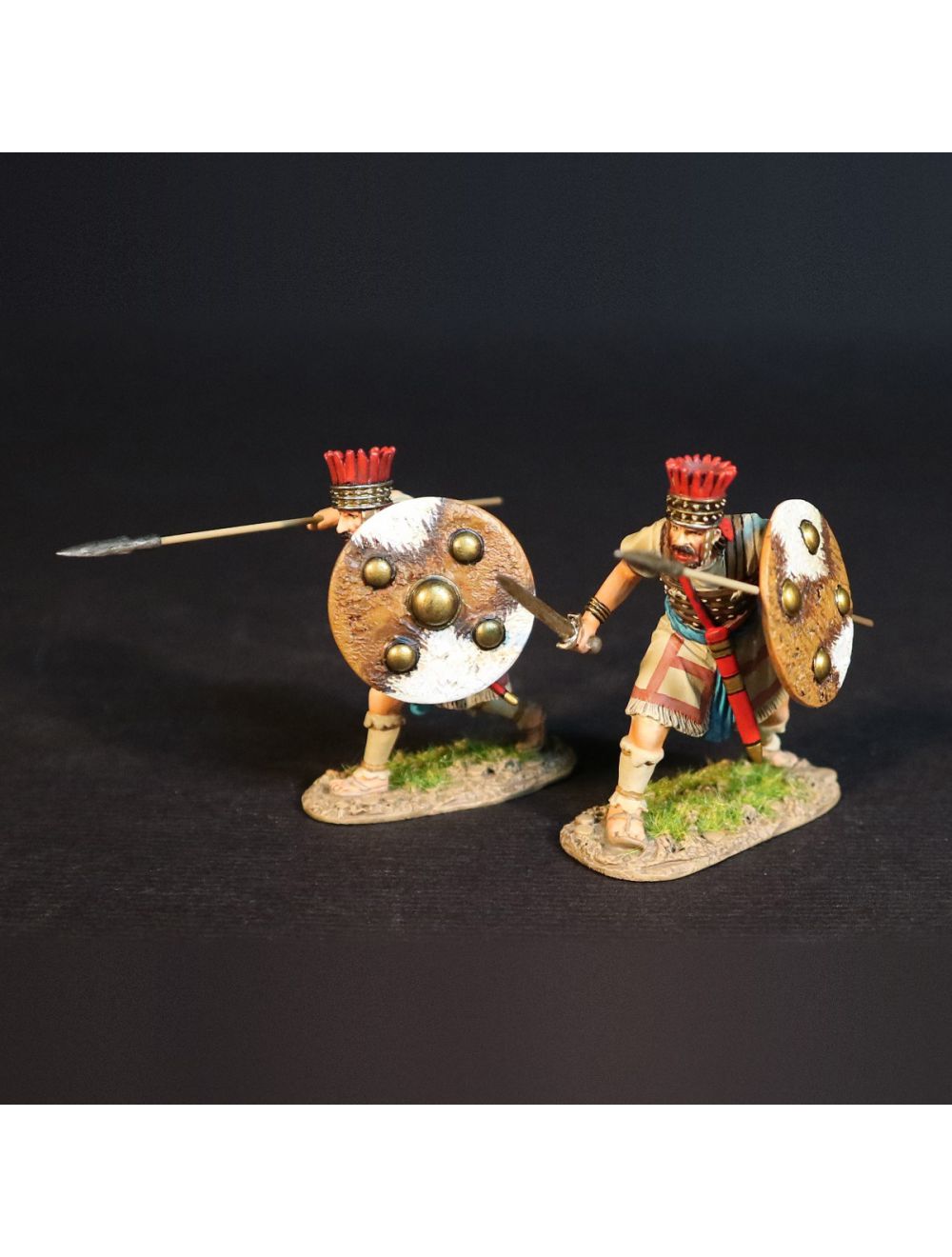JJ-TWTLK-03 - 2 Lycian Warriors
The Trojan army defending the great city of Troy, led by their king Priam, had assistance from a long list of allies. These included the Lycians, which was a maritime district in south western Anatolia (now Turkey). It was situated along the Mediterranean coast between Caria and Pamphylia, and extended inland to the ridge of the Taurus Mountains. In Homer’s Iliad, the Lycian contingent was said to have been led by two esteemed warriors, Sarpedon (son of Zeus and Laodamia) and Glaucus (son of Hippolochus).
The Trojan army defending the great city of Troy, led by their king Priam, had assistance from a long list of allies. These included the Lycians, which was a maritime district in south western Anatolia (now Turkey). It was situated along the Mediterranean coast between Caria and Pamphylia, and extended inland to the ridge of the Taurus Mountains. In Homer’s Iliad, the Lycian contingent was said to have been led by two esteemed warriors, Sarpedon (son of Zeus and Laodamia) and Glaucus (son of Hippolochus).
Sarpedon fought on the side of the Trojans, with his cousin Glaucus, and was one of Troy’s greatest allies and heroes. In the Iliad, Sarpedon scolded Hector, claiming that he left all the hard fighting to the allies of Troy and not to the Trojans themselves, and made a point of saying that the Lycians had no reason to fight the Greeks, or no real reason to hate them, but because he was a faithful ally to Troy he would do so and fight his best anyway. When the Trojans attacked the wooden stockade wall built by the Greeks, Sarpedon led his men, including Glaucus and Asteropaios to the forefront of the battle and caused Ajax and Teucer to shift their attention from Hector’s attack to that of Sarpedon’s forces. He personally led the attack on the battlements and was the first to enter the Greek encampment.
This attack allowed Hector to break through the Greek defences. It was during this action that Sarpedon delivered a speech about “noblesse oblige” to Glaucus, stating that they had been the most honoured kings, therefore they must now fight the most to repay that honour and prove themselves and repay their loyal subjects. While he was preparing to plunge into battle, he told Glaucus that together they would go on to glory. If they were successful, the glory would be their own. If not, the glory of whoever stopped them would be greater. When Patroclus entered the battle in the armour of Achilles, Sarpedon met him in combat. Zeus debated with himself whether to spare his son’s life even though he was fated to die by the hand of Patroclus. Hera reminded him that other gods’ sons were fighting and dying and other gods’ sons were fated to die as well. If Zeus should spare his son from his fate, another god might do the same. Therefore Zeus let Sarpedon die while fighting Patroclus, but not before Sarpedon killed the only mortal horse of Achilles. During the fight, Zeus sent a shower of bloody raindrops over the Trojans’ heads expressing the grief for the impending death of his son. When Sarpedon fell, mortally wounded, he called on Glaucus to rescue his body and arms. Patroclus withdrew his spear which he had embedded in Sarpedon, and as it left Sarpedon’s body his spirit went with it.
A violent struggle ensued over the body of the fallen king. The Greeks succeeded in gaining his armour (which was later given as a prize in the funeral games for Patroclus), but Zeus had Phoebus Apollo rescue the corpse. Apollo took the corpse and cleaned it, then delivered it to sleep (Hypnos) and Death (Thanatos), who took it back to Lycia for funeral honours.
Scale: 1/30
Material: Pewter alloy and synthetic fibers
Released Date: September 2023
| Years | Bronze Age |
|---|---|
| Gender | Men |

 Français
Français

